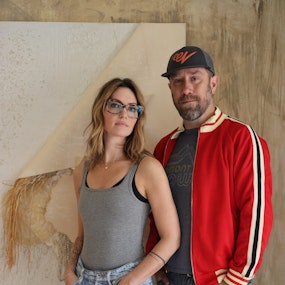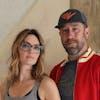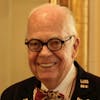How We Created An Award-Winning Boutique Hotel Management and Development Company - Meg Kennedy & Rob Blood, Lark Hotels

Lark Hotels is an award-winning boutique hotel management and development company, and in this episode, we hear from their founders - partners in life and in business - Meg Kennedy and Rob Blood - about their fascinating story of getting started in hospitality, the career opportunities this industry provides, expressing creativity through hospitality - and much more.
Join in the conversation on this episode on the Hospitality Daily LinkedIn page here.
This episode is brought to you with support from Actabl. Discover the power of actionable insights with the software company dedicated to meeting the evolving needs of leading hospitality businesses. Actabl's suite of leading solutions, including ProfitSword's AI-powered business intelligence, Hotel Effectiveness' labor optimization, ALICE's operations management, and Transcendent's asset management, harmonize data, work, and people seamlessly. By hoteliers for hoteliers, Actabl is the key to elevating profits and guest experiences. Explore the possibilities at actabl.com and unlock the potential of your hospitality business today.
Rob It's an interesting story. And I think that is one that resonates with a lot of people, because hospitality is always bathed in this romantic light, right? The art of hosting people, baking muffins, creating experiences, and all that kind of stuff. And so I was in my my mid-20s, and I was working in education. And I think early on, I had always had this drive towards some kind of hospitality, whether it was like dreaming of going to brewing school, which my parents shut down right away, or the idea of owning and operating a country inn or tavern or something like that. And so I was teaching and there was this Yankee magazine contest to win an inn, write an essay, submit a $100 application fee, and review fee. And if they received enough of them to meet the owner's goals or the seller's goals, they would select a winner. So I wrote my heart out, right? I told all of my stories about why hospitality was important to me and my family and all that kind of stuff. And it turns out it wasn't a viable contest, but it got my juices flowing. And so I started researching spots where I might want to live. And I'd never been to Nantucket, which is where I ended up, but spent a couple of days out there at the youth hostel. Went to see a show at the Chicken Box. rode my bike around the island, and very quickly found an in-keeping job at the Sherburn Inn on Nantucket. It is an eight-room inn, and the couple who had run it was very successful. They had successful former lives, but they were the first people that I really saw who turned in-keeping into a viable lifestyle. So moved to Nantucket, they turned over the keys, and left I think it was like pasta salad in the refrigerator for my first night on Nantucket, and said, good luck with the muffins in the morning, you should be okay. So I ended up being an innkeeper on Nantucket and working for a couple where the husband had an MBA from Harvard and his partner Susan was like the consummate Julia Childs or Emily Post had a perfect hospitality soul and learned everything except that the first morning the muffins didn't come out of the pan. And so it was an English muffin and bagel morning for the guests. And I really felt like that was the purest form of hospitality that I've been involved with. When you live in the basement of an inn, you make the muffins, you iron the sheets, you do everything yourself and create all these experiences for guests. And so that's what really sort of whet my appetite for what we do now at the very core of it. There's a lot more, you know, but that's the root.
Josiah Yeah. I love it. Amazing story. Meg, what about you? How did you get drawn into the hospitality business?
Meg You know, a lot more randomly, I think, than Rob. I went to the University of Rhode Island. I had lived in Newport for a few summers while I was there. And then I'm originally from Connecticut. So I moved back home. And, you know, my parents were both government workers. And so they really wanted me to, like, do that and get the good pension and everything like that. So I started there. I was working for the school choice office in Hartford, Connecticut. And I'm like, this is not for me. People would and nothing, nothing again. But, you know, people would show up in their pajamas, like in their slippers to the government office. I'm like, no, I can't. Like, this is just not my environment. So anyway, I kind of just like started poking around. And this opportunity came up at the Atwater, which was one of the first hotels. And, you know, It seemed as though it was again like I read it as like this romantic opportunity and it seemed as though I didn't need much experience I had a little bit of experience managing people and like. In sales and here and there and so I applied randomly thinking why not and then here I am so I was the general manager of the app. For two or three years, that was back in 2012, I think I started there. And then, you know, my element was always sort of like the visual and creative aspect of it. So I really gravitated toward the breakfast, making the breakfast and making it creative. And so because the company was small, and we were essentially just a startup, I did a lot of different roles and I sort of like, you know, bootstrapped it and learned hospitality. I was a director of hotels for a little while and now I'm the creative director. And so I have a lot more. I'm doing a lot more of what I like now, which is the visual oversight.
Rob I think our paths were interestingly similar. We started out, learned everything there was by doing it, and then translated it to figuring out how to do it for other people and figuring out how to teach other people to do it. And for us, it was really for both of us, it's a fundamental. We always say this is not rocket science. This is really an emotive, intuitive business where if you have the right disposition, you can be successful. We are here to create experiences for other people, and whether that's through culinary experiences design experiences, or just pure connection to other folks, it's all an internal thing. It's a hard thing to teach the want. It's pretty easy to teach the task. So we both came from a background of no experience in hospitality but had an orientation towards it, which led us to seek out this wild, crazy life.
Josiah I do want to talk a little bit about kind of the career opportunity here, because for me, this is fascinating hearing you both, because as you point out, Rob, it's not a huge barrier to get into. At the same time, there are some hotels that keep winning awards and recognition like your hotels, and there are many that do not. Right. So there is maybe kind of this learning curve, but there's there's ways to excel in this game. Right. But you can get started. And I think that's encouraging. I think what's interesting, I want to pull on a couple of threads here. You mentioned, Rob, this couple, you know, Harvard Business School, you know, graduates, and they end up in hospitality. To you, when you kind of first met them and heard their story, what did that mean to you in terms of kind of what is the long-term kind of career potential here in hospitality?
Rob That's a very good question. And so a lot of people come to bed and breakfasts and inns as a retirement plan or a nest egg, and they don't necessarily see a long-term path. Dale and Susan, the couple who own the Sherbourne Inn, had been successful in prior lives, which enabled them to buy an inn on Nantucket, but it wasn't a hobby for them. And so I learned from their business approach and what they taught me that small, well-located inns could be a life path rather than a nest egg or a hobby. And I think that the core of that was what I learned about location. Everyone knows this, right? Location, location, location. And before moving to Nantucket, I was thinking, can I scrape together enough money to buy a place on the side of the road somewhere in New Hampshire, potentially work outside to support it, and scrape by? When I moved to Nantucket, I learned that There's a path to paying a big mortgage, paying yourself, and having a fulfilling lifestyle through well-located, appropriately-sized hospitality ventures.
Josiah I want to get into that because I feel like this is an amazing way to kind of tee up the, you know, the Lark story and what you're doing at Elder and Ash. But I wanted a quick follow-up for you, Meg because I think what you mentioned is also really interesting to me because, you know, you're running everything at these hotels, right? You're the general manager, you're overseeing it all. And then now you're kind of doing this deep dive into brand and concept and design. And I'm curious what you saw in hospitality as maybe an interesting way to express creativity. Is there something about, you know, the buildings and the real estate and hospitality that gave you an interesting canvas to go deep in this one area of hospitality?
Meg Yeah, I mean, the honest answer to that is everything. I think hospitality is such an interesting art experience because it's really all of the senses. And so that's kind of what I always had focused on early on when I was, you know, sort of leading a different operations team. It was always focused on like, okay, the smells, the sights, the sounds, everything matters. Like this is a whole like we're putting on a performance. And so I was able to like nitpick little like avenues everywhere but it was all very intertwined to me because it was always so satisfying to see people recognize all of those things and they don't even know that they're looking for them or they don't even know that they're happening to them but they having this experience because all these things come together. So that was I really liked kind of the discovery of that and that's sort of what fueled me.
Josiah I love it. So this could be for either of you or both of you, but take me to that moment when, you know, you're working at these other properties and then what led up to the founding of Lark Hotels?
Rob So that's a good question. I think that I have an insatiable drive to create grow and do new things. And so my initial thought was, well, I could be happy at this inn, being an innkeeper for a very long time. This was in the first property that I acquired. And very quickly, my mind started wandering to, well, what happens if I could buy that across the backyard or the one across the street? And then, you know, eventually, the whole neighborhood, which we have done now, but it was like 20 years later, didn't happen that quickly. And so I recognized for myself that there was beyond hospitality and entrepreneurial spirit that was really driving me. And we had some success early on in creating experiences that were unique in our markets. So we had Captain Fairfield Inn in Kennebunkport and the Veranda House on Nantucket. And both were very different from the other properties they were around. Not from the outside, but on the inside. And that's sort of our philosophy of unpretentious, not prescribed hospitality. We'd bet on breakfast, have a lingering, nagging, connotation of like the overbearing host or like breakfast with everyone plus the host or wine hour and you're sitting with everyone. And we just felt like there were too many rules in that. And so when we started developing Captain Fairfield and Veranda House, we're not going to do this the old way, the historic way, the way that's been prescribed over the years.
Josiah And just a quick follow-up on that, you mentioned also pretension, which may or may not be related, but I think some concepts almost become too cool for themselves. And what is the pretension element you're looking to avoid?
Rob We want to make sure that we're meeting our guests eye to eye. And that means I'm Rob, this is Meg, you're John, you're Susan. We want to make sure we are doing it without our own pretense. There's no sirs, there are no madams, there's no starched collars. We feel like when people are on vacation, they're there to relax and we want to be able to meet their expectations and figure out where they want to be without our preconcept like layering over our agenda on top of theirs.
Josiah I think just to follow up on that, something you mentioned before, I think you noticed from your guests is that many of them, they're traveling with their partner or significant other and they want to spend time together. Right. And it's almost like we can shoot ourselves in the foot where we try to be too hospitable and it's like ends up not being what your guest wants.
Rob Right. That's totally it. We want them to be able to interact with us how they want to, whether that is through a texting app or their iPad in person or on the phone, however they want to do it is our preference. Because I know when we travel, we've checked into some places and the tour doesn't end for an hour after you've gotten there. And we're just like, can we just go? Can we just like we know how to find the coffee maker? We know how to find you. So it's all you know, hospitality is truly about reading people and figuring out what they want. Some people really want to know they want the full property tour, the whole history, all this stuff. And that's great. We're there or our hosts are there. But anyway, we Lark started because we saw this gap in the New England hospitality landscape. There are so many great places to stay in New England. But a lot of them when I started were pretty tired. They were very traditional. a little bit, we like to say like a porcelain doll and doily laden and all that kind of stuff. And so we saw an opportunity in these markets that were largely mom-and-pop driven to layer a little bit of sophistication in marketing, revenue management, and design, and bring an updated sense of purpose to New England travel. And so New England became our test kitchen for that. And when we launched LARC in 2012, we had the Atwater, we had Chapman House, Veranda House, and Captain Fairfield Inn. So Nantucket, Newport, and Kennebunkport. And we thought that's a pretty good start to a collection. And it started out really as a marketing group for these four properties that I had ownership in. And Meg was there, but in 2013, we won. We were on the Condé Nast hot list for the Atwater. And that's really when it all got kicked off. And other people started asking if we could work with them to operate their properties or help conceptualize them. And here we are.
Josiah Amazing. Can you tell me just a little bit more about that? So you start out as a marketing group. You had ownership stakes in these hotels, but you're marketing or representing them, helping them attract guests. And then now it sounds like you're integral to everything from new development to design. Is that right? So you've kind of moved core into the operations, into the creation of these things.
Rob Yes, so Lark Hotels at its very core is a hotel operating company. We only work with groups that want a full suite of services because we believe that the finger should only be pointed in one direction. If we're managing revenue, marketing, operations, and accounting, we are fully responsible and accountable to our owners and clients. If we carve out a piece, let's say we carve out marketing, there's no way for an owner to really hold us accountable for top-line revenue because we're not driving it in. And so we believe in being fully accountable. On the other side, the development side, we believe very, very emphatically that from the beginning of the project, we add the most value. because we can be involved in the concept, the design, all of the stuff that Meg was talking about with Scent, the full experience. And we can also make sure architects are putting housekeeping closets in, which they sometimes forget.
Josiah That's fascinating. I wonder if we could, if you're comfortable, what if we kind of did a deep dive into one of your recent projects that you're most proud of? And Meg, I wonder if you kind of walk us through kind of like how you think about this, like to your point, Rob, the very earliest stages. Does that sound good? We could talk about whatever property, you know, you're most proud or excited about.
Rob We're so proud of all of them. It's like, are you asking about our oldest child or our youngest?
Meg We all are special in our own way.
Rob Maybe talk about Blind Tiger Burlington.
Meg Yeah. Okay. Yes, we have this brand, Blind Tiger. We're getting it to the point of being its own brand, but it's really something that I gravitated towards because as Lark changes and grows and he loves the next opportunity, is always a yes, for the most part. So for me, Blind Tiger has allowed me sort of to stay close to what I really enjoy doing on like, even like on a very hands-on basis. And so our first Blind Tiger was in Portland, Maine, it was a nine-room. And we both just loved it like we had admired the building for quite some time.
Rob Meg actually lived right next door to it for a period of time. And it's just an amazing, beautiful building.
Meg And we were super, super excited that we were able to purchase it. And that's kind of what kicked off the brand. It's this gorgeous historic mansion. But we found that that model happened to be quite successful. Just the very high touch curation and like very unusual design and you know, very hands like a hands-on approach to hospitality and in a small setting. And so we've set out to kind of expand that. And recently we found a place in Burlington, Vermont, and it kind of checked all the boxes. It's this gorgeous, gorgeous brick mansion. It's on a residential part of town on a residential street, but very walkable to downtown. And Blind Tiger for me is just like You know, I like art in a lot of different forms. I like to paint. I like to take photos. But Blind Tiger is just a huge work of art for me. And this is really much more from my perspective than it is like what I would say if I was talking to like a client about why like what the design is or anything like that. But So that art project sort of begins in this like collection phase. And so we collect things or I, I'm a collector, I love to collect things Robin, I love to go to Hudson, New York, we look for antiques, we, we sort of incorporate this hunting phase into our own travels. And so we collect awesome stuff from all over the place. And we collect things.
Josiah Just on that, you mentioned being next door to this property when there's a potential new project, do you actually move there for a bit? Or like, what do you think of the collection phase?
Meg Yeah. So the property that I lived near was in Portland. The one that I was talking about is in Burlington, Vermont. OK.
Rob Portland might be an interesting one because we really did spend a year collecting. Yeah. Wow. Just one quick step back. I think we have different roles. And so my initial role is to determine the economic viability of a project. Is it going to work? Is the market good for it? For me, it doesn't necessarily. I don't always think this is going to be an X, Y, or Z. I think this can be a successful hospitality endeavor. And then Meg and I started our collaboration, and I think the way you described it was perfect, like an art project. and sort of a hunt for all of these things. Certain hotels are designed very much in the mind and other hotels are designed over the course of time. So with Blind Tiger Portland, we had a year because we were operating it as is before we started a renovation. And so there was a lot of percolation time there. And so that's when Meg references Hudson and other spots, we know the space. And so as we're traveling and as we're searching, there's always something in the back of our mind that that's going to be perfect for blind tiger, even if it's not, we're going to find a way to make it work.
Meg Yeah, that's sort of Yeah, like when we talk about this collection, phase it's for me being somebody that like I have like a deep appreciation furniture and for artifacts and for fashion and for art in general so it's like I just want to share it like I so when I find constantly searching for like the most unique thing I can find and I collect all those things and it's like my pleasure to share it with our guests in this whole experience and so it's super fun for me and for us I mean you know, the whole process is just like a little bit different than designing a larger, more streamlined hotel. So that's sort of, I gravitate a lot toward that, that process, doing these smaller, more intimate spaces. And I'll typically also work on our, on like the common space accessories and things like that. These like little elements that are very like close to, very close to home or like the human elements of the design sort of.
Josiah What makes a great common space?
Meg My easy answer is books and blankets.
Rob A few pillows, a few pillows and a wood-burning fire.
Meg Yeah, fire. Got to have fire.
Josiah I love that. I was talking to somebody just before this who said you got to have a pillow where you could sit on the couch and you could just hug it. Yeah.
Meg Yeah.
Rob Yeah. Also a place where you feel comfortable kicking off your shoes and you don't feel like you're going to if you break something, you're not going to be in trouble. Or if you spill something on the rug, it's not going to be the end of the world. We always talk about designing spaces that people live in rather than the perfect hotel. The perfect hotel has charging outlets, it has power in the bed, it has all this other stuff, but you don't live like that. You live in comfortable furniture and with beautiful things and that kind of stuff.
Meg Yeah, we've found too many times, I would say, You know, I think it's pretty hard for us to find a common space that we absolutely love to spend time in. It's happened before and we've taken a lot of inspiration and we've thought really hard about like, why do we like this right now? But we go to a lot of places where it's the furniture is hard. It's in a fabric that, you know, and it's going to last them quite a long time. So I commend people on that. No one is going to last a long time because nobody's sitting in it. So like our mission is to create the experience And have furniture we like furniture that like we try to think forward a little bit like okay is this piece of furniture gonna wear well we don't mind if things get slightly worn. And they look like they've actually been lived in because they have it's more like okay. you know, what kind of fabric is going to allow us to hold on to this piece for a while, but, you know, also allow people to enjoy it type thing. So we take a pretty balanced approach there.
Rob And can it be patched like a vintage leather armchair is so much more comfortable than something you just bought, but it might have two patches on it because it started to tear. And it's just it's like a lived-in experience. And I think like for Blind Tiger, again, sort of going back to the root of the question, we have to see how these small things work, right? Because small doesn't always work, especially when you have a management company involved. And so they have to, for blind tigers or small properties for us, they have to be in highly trafficked areas for blind tigers in highly cultural cities because the city is the amenity and the connection to the experiences and the connection to the people of that city is why people stay with us at blind tigers. And so we have three right now. There's no skyrocketing plan to have a hundred of these because they have to be very thoughtfully planned and they have to be in the right spots like Asheville, Burlington, Portland. People go there because they want to be connected to the locale in a more meaningful way than just happening to stay in the downtown hotel that could be anywhere.
Josiah I wonder, early in our conversation, Rob, you mentioned having right-sized properties, and I'm curious how you think about that, because it feels like that affects so much from what you can build from a design perspective to the staff you can hire. What do you think about sizing in these different locations?
Rob It is entirely bespoke, right? So the nine-room inn in Portland at Blind Tiger would not work in Laconia, New Hampshire, right? because the demand isn't high enough, the rate isn't high enough. And so when we are looking in markets, we kind of try to figure out what is most economically viable for a particular property. In a market like Boston, where there's so much inventory, it's possible that a small guest house would stand out because there's high demand. But you put a nine-room property in New Orleans where there's so much inventory and rate is relatively low in general, it will never work because you have to staff it one way or another, whether it's nine rooms or 90 rooms. And so that's sort of a long answer to the short question. The short answer is there's no metric that tells us what will work. It's just a lot of market data. 20 rooms across the beach in Malibu and you buy it for a million dollars a key, that's going to work. 20 rooms on Route 20 in the Berkshires at a million dollars a key, it won't work. There's no way. So it's highly, highly customizable and sort of bespoke approach to looking at investment.
Josiah I wonder if we could talk a little bit more about this, because some of the themes about being embedded in community or these kind of things, a lot of people talk about. But again, what you both have built at Lark, you're the ones winning the awards, you know, getting the press coverage, getting on the hot list, getting the attention, the recognition. People love them, both media and guests. And so I'm curious about these areas, the things you do differently, and I'm sensing deep analysis around the viability of an area, what scope of a project it will support. But even going back to what we're talking about, furniture is fascinating to me because a lot of these lifestyle hotels look like it was, I don't know, purchased from West Elm or pick your favorite, you know, mass market, mid-century modern, you know, design. But you talked about, you know, leather chairs that maybe have some patches. And so it could be on a design level. It could be something else. But I'm curious if other things that you've done that you kind of think differently than the industry or you've done differently that are getting you these results.
Rob This is a good question. You have a good answer. We are almost always asked about what we do differently.
Meg Yeah, it depends. I think Lark, our Lark brain, and our Elder and Ash brain are highly connected, but a little bit different. And we started Elder and Ash because we have a hospitality background and we wanted to use those skills that we'd learned to make more sense of the process for owners of hotels and for investors. We can also speak with operators, which is helpful. As a designer, we know the coffee table has to have this function, and we know about ADA rules and what you need, and how to speak the language of like, okay, like Rob said, do we have enough housekeeping closets? How is this going to operate? That was the real reason that we started Elder Nash anyway is to sort of like bridge the gap between them.
Rob Yeah, I think what we see, Josiah, a lot is that there's a lot of fragmented approach to hospitality development. You'll have a lot of services, a lot of specialists involved, and in the same room. But not always on the same page. An architect has a different goal than an interior designer. And a private equity investor has a different goal than an owner-operator or mom-and-pop or even a high net-worth individual who wants to have a stake in the community by developing a hotel. And we have done all of it, right? We've done all of that. We sit in the owner's seat. We sit in the seat of being responsible to private equity groups who invest in our hotels. We have made crazy mistakes along the way with selection. We've, through our own eyes, seen mistakes and lived through them and fixed them. And we're also avid travelers that we are incredibly experienced collectors. It's where we find all of our inspiration when we're on the road and when we're staying in great hotels or terrible hotels and discovering new places. And so what we do differently is I think we, and other people may say this, we bring it all in-house. We have trusted people we work with all the time. We've got a great team and we know what we like. And a lot of the times, And we also, last thing, and I think Meg might jump into this too, is we don't design to our personal taste, we design to what the project wants to be. And so there's no ego in it, there's just, we want it, we want the property and the experience to be everything it can be.
Josiah Yeah, no, that makes a lot of sense. And I appreciate that distinction, Meg, around kind of Elder and Ash versus Lark Hotels is one of the same, but there's kind of like a different is like different lenses I'm hearing of thinking about this.
Meg Yeah. And to sort of add on to what Rob said, I think there are like you said, there are other companies that bring everything in-house. I think what we do as, you know, as Lark, as a management company, we will figure out how to best operate any size, anywhere. If the opportunity is right, we will do it and we will figure it out. And our team is super good at flexing and they've done it all too. They've operated nine room inns and they've operated hundreds of room inns. And so that's one piece. And I think with Elder and Ash, I think certain companies will have their in-house design studio. And in some ways, it sometimes makes the hotels feel like a similar, like a very, very similar experience over and over. And it's our goal to make the experience different. Like we want people to discover something every single time. So we don't have a particular, well, we try not to have a particular design aesthetic of our own. We just try to, you know, think about what the project needs and how does it compare to the market and, you know, from a design lens or programming lens operations. And so when we talk about like bringing it all in house, we do that, but it's really individualized still for the project.
Rob Right. But in the Lark brand, every hotel has its own story and needs to be told through design and architecture, scent, hospitality. I think that I was an English major and my passion when I was in school was sort of creative writing and storytelling. And so this is a different way to do that. It's a little hackneyed to talk about storytelling in hotel development. Meg's like cringing inside. It's like if I were to say, live like a local, she would break out into hives. But it's true.
Josiah I mean, that's going to be the episode of the title episode.
Rob She would have you edit that stuff out. But again, as an operating company, if you look at our team page, every single person on that team page has had a line-level job. We are not like Cornell Hotel School master's students. We are students of real life. And like Meg was talking about, she bootstrapped it. That's how I did it too. We learned all of the lessons on the road, in hotels, and made mistakes, but we also figured out that they were wrong at Cornell when they said you can't make money on a sub 100-room hotel. We've been proving that thesis for the last 15 years. And since COVID, everyone else seems to agree with us, which has been challenging because everyone's looking at the deals we're looking at now, where no one was before.
Josiah I want to ask this question of both of you. Where do you get inspiration to think differently? You talk about being students of life. I think that's a that's a good point. But anything more specific where or let's talk about the present day. What's inspiring you now?
Rob Well, look, Meg is just weird, OK? She loves weird stuff.
Meg She I get inspiration from art fashion and culture. And like I would love nothing more than to do something that other people haven't done. So that's it for me. So I try to figure out what those things are like because I do really dislike trends. So I try to figure out what's the other thing that, you know, is…
Rob Yeah, what's more meaningful than what's happening right now? Because what's happening right now is happening all over the place. Everyone's doing it or everyone's trying to do it. It's like what you're saying about mid-century. Mid-century had its day where every dude in the world was like, I would like to stay in a mid-century hotel. It's worthy.
Meg I mean, like mid-century, mid-century is a very worthy design style and era. And I think I think it belongs everywhere. Still, I just think it did get a little overdone with like you know, the real mid-century stuff, actual stuff from the mid-century belongs places, but you know, the reproduction.
Rob Yeah. So this is going to sound lovey-dovey, but I'm inspired by Meg. She inspires me. Her creative process is very organic and intense and it blows me away. I actually, so I find a lot of inspiration in my partnership with Meg and just watching her do what she does. For me, it really is travel. I need to be in new places. I need to really experience new things, and I wanna do it in different ways. I don't always wanna stay at a luxury resort. Sometimes I wanna stay at the downtown Airbnb, and that's probably sacrilegious to say for a hotel guy, but sometimes I wanna live in a neighborhood. We're talking about going to Savannah, and we just wanna, if you were staying in a hotel, you'd be staying downtown, right by the river, We want to go stay by Thomas Square, which is where the emerging restaurants are happening and just rent a two-bedroom house and live there for a week.
Meg And if we had a blind tiger, that's where it would be. It wouldn't be downtown. It would be. And so like this is really this is Blind Tiger is sort of us recreating our, you know, trying to share what we love about travel with other people for that particular brand.
Rob Yeah, and we touched on this a little bit, but I think that our company has evolved a little bit as our life has evolved. We have three kids, right? 12, nine, and three. And travel's different now. We want to travel with them. But hotels aren't really set up well for us. We're traveling across the country from St. John to San Diego. We stopped in Houston. I couldn't figure out, with all of Marriott, all of Hilton, how to book an adjoining room. There were no guarantees you were going to have an adjoining room. So where's my three-year-old going to be sleeping? Not in my bed, but maybe somewhere like when we're in the third. And so with Bluebird, which is our upper mid-scale brand, it's been really thoughtfully articulated to how do we accommodate families? How do we have diverse room types that maybe there's a nook where you can put a pack in play because that's all a baby needs. You don't need to rent a whole nother room for your three-year-old if you well, sometimes. But so I think that through our phases of life,
Meg Our thoughts inspire us based on our family, based on our life situation, based on, you know, yeah. So I think that's been true. Definitely.
Rob Yeah. Yeah. Like our friends are all sort of in the same situation. Can you put your kid to bed and be close enough to a monitor to get a drink at the bar?
Meg You know, we think about those things now, like, yeah, where we hadn't before.
Rob Right. So fashion inspiration. You can see it everywhere. If you look at Blind Tiger Burlington and the fabrics and the patterns, it's like if you put them on clothes, the clothes would be incredibly cool.
Josiah I love it.

Rob Blood / Megan Kennedy
Founder, Principal
Rob Blood
Rob began his hospitality career, at the age of 26, as the innkeeper of an 8 room bed and breakfast on Nantucket Island in Massachusetts. It was there that he first developed an affinity for creating experiences for guests, tight hospital corners and freshly baked scones. It was also there that he learned that smaller, well located and carefully conceived hotels could be profitable.
In 2004, just a year later, he purchased his first lodging property in Kennebunkport, Maine. Now after nearly 20 years, he is involved with the management and ownership of more than 50 thoughtfully considered hotels and over a dozen restaurants throughout the United States. Rob takes pride in having worked every position in his hotels from toilet scrubber to line cook to general manager and attributes the success of Lark, not only to his ability to learn on his feet, but mostly to his knack for bringing amazing people together.
As the founder of Lark, Rob is the steward of a portfolio of real estate valued at over $500MM with an annual revenue stream nearing $100MM. His devotion to creating great experiences extends beyond the obvious experiences that guests have to Lark’s crew and the many investors that make our hotel development possible.
In addition to his role at Lark Hotels, Rob is a partner in the design studio, Elder & Ash and a principal at Lark’s affiliate development firm, Lark Capital.
Most Popular Episodes
Check these out:























